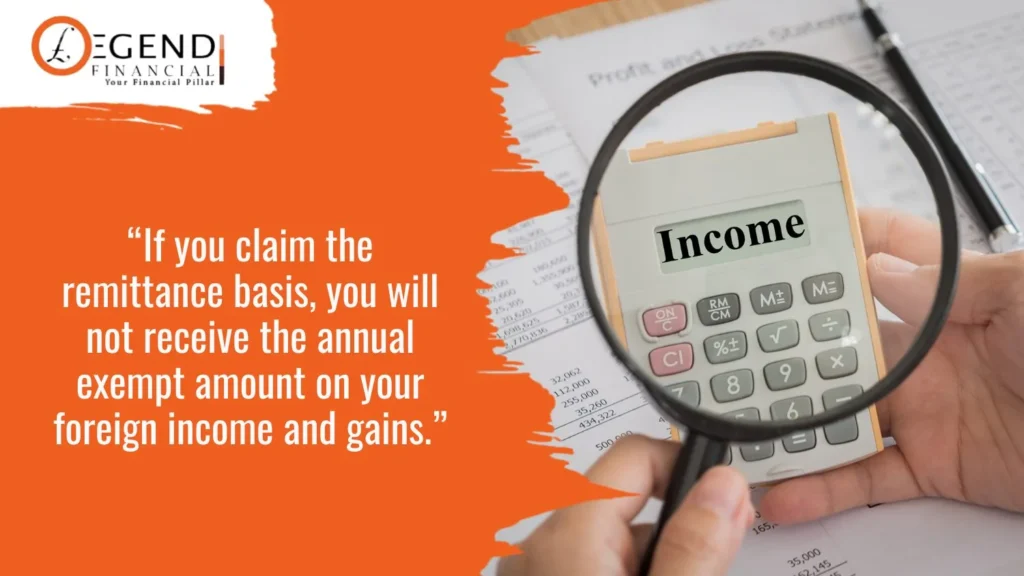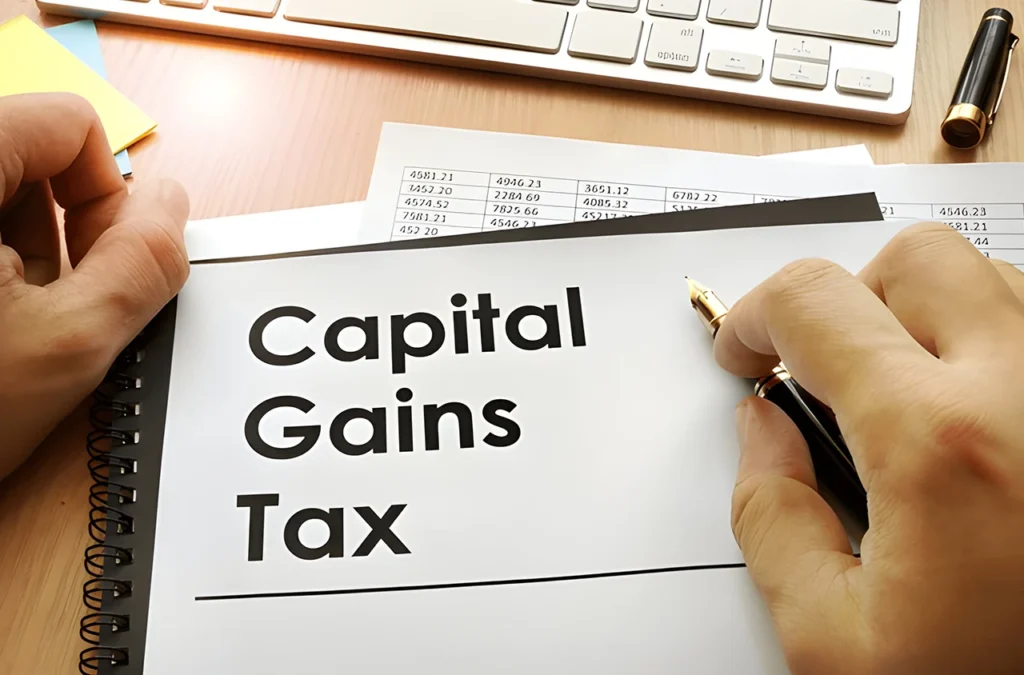Contents
Capital gains tax rules get trickier when it involves overseas gains. A rule of thumb is that UK residents, including those ‘domiciled’ for tax purposes, pay capital gains tax when selling a residential property or investment, whether in the UK or abroad. If you are a non-resident, you are generally only liable to tax on your UK gains.
Below, we cover the latest capital gains tax rules you need to know when making overseas gains. Note that this guide does not substitute for professional guidance. Expert advice is crucial in this intricate area of tax.
Tax When You Sell Overseas Property
Capital gains tax (CGT) is charged on the gains made from selling assets, including overseas properties and investments. Whether you pay CGT on overseas gains or not mainly depends on your UK residency status. If you are a UK resident or classed as a domicile for tax purposes, you are typically liable to CGT. Non-residents in the UK do not pay CGT on their overseas asset disposals, only on their UK gains.
The CGT Annual Exempt Amount (AEA), which is your tax-free allowance before becoming liable to CGT, is available to most people, including non-residents. For the 2024/25 tax year, the personal CGT threshold is at £3,000. Typically, these rules apply around overseas asset sales, but many other considerations come into play (more below).
Good News: If you sell your ‘primary residence’ overseas, which is the term used by HM Revenue and Customs (HMRC) for main and only dwellings, you may also be eligible for Private Residence Relief. Qualifying for this relief can help you avoid or minimise CGT bill.
Visit relevant article: Do I Pay Tax if I Sell My House? A Beginner’s Guide.
Capital Gains Tax Rules for Residents
UK residents and domiciles are liable to capital gains tax on both their UK and worldwide gains. The CGT bill is calculated on the gain, which is the difference between the purchase price and the selling price, minus any allowable expenses. Through double taxation agreement, UK residents may receive relief for taxes paid in the country where the property is located.
For the 2024/25 tax year, you pay CGT when you make annual gains above £3,000. Currently, the rates on both UK and overseas residential properties are:
- Basic rate – 18%
- Higher and additional rate – 24% (28% on carried interest)
Pro-Tip: The UK tax system only allows you to elect one main residence. For married couples or civil partners, this rule applies jointly, meaning only one property can be designated as the main residence.
CGT Rules for Non-Domiciled Residents
Non-domiciled residents use the remittance basis of taxation, which allows them to be taxed only on their foreign income and gains brought into the UK, not all global income and gains. This is called non-dom tax status regime (or remittance basis), which had been followed by the UK government for 225 years since 1799.
Being non-domiciled in the UK typically means you were born in another country and plan to return there. Your natural domicile country is usually where your father considered to be his permanent home in your birth, but it can change if you move abroad and do not intend to return.
Need to Know! The non-dom tax status regime will be abolished by 6 April 2025, to be replaced by a residence-based system. New non-doms will get tax exemptions for the first four years. After that, they will pay the same taxes as other UK residents on their global income and gain.
Current non-doms will be taxed at 50% of their overseas earnings in the first year under the new regime. They will have a two-year transition period starting April 2025 to bring their foreign wealth into the UK system.

CGT Rules for Non-Residents
Generally, legitimate non-residents are not liable to capital gains tax on their overseas gains. However, in the following cases, you may have to pay CGT:
- Returning to the UK within 5 years of leaving. In this situation, you are considered a temporary non-resident and will be classed as a UK resident again for tax purposes.
- If you were abroad not more than a full tax year (6 April to 5 April the next year), you remain a UK resident for tax purposes.
- If your foreign income or gains are £2,000 or more, or you bring money to the UK.
The temporary non-residence rules prevent tax avoidance for individuals who stay abroad briefly to make non-taxable gains. If you return to the UK after temporary non-residence, the portion of gains not charged to CGT initially may be liable to UK CGT upon return.
Double Taxation Agreement
The UK has comprehensive double taxation agreements (DTAs) with over 130 countries defining which country has the overruling right to tax incomes and gains. You can also claim double tax relief if you are taxed on the disposal of an asset in both the UK and another country. This may be in the form of UK credits for the CGT paid abroad.
A Caveat: DTAs help avoid double taxation and promote international trade and investment, but HMRC guidelines and abroad can be complex and will largely hinge on the circumstances and the terms of the double tax treaty. Seeking advice from tax professionals will ensure you avoid paying CGT twice.
How to Report and Pay Capital Gains Tax
UK residents report and pay tax on their overseas gains through a self-assessment tax return within 30 days of selling the property. Non-residents selling UK residential property, whether they owe tax or not, will need to report to HMRC via a different return called NRCGT.
Click here for more information about how to file self-assessments: A Comprehensive Self Assessment Guide for Beginners.
Expert Tips to Reduce CGT on Overseas Gains
Here are a few ways you can avoid or mitigate your CGT liability:
- Maximise your annual CGT allowance, as this cannot be carried over to the next year, be sure to deduct allowable expenses from the capital gain, and claim the double tax relief if applicable.
- Elect your main residence strategically for the Private Residence Relief (PRR), as you are only allowed to elect one. You can elect your foreign property as your main residence for a short period (e.g., one week), allowing you to gain three years of CGT exemption on that property.
- Holiday homes are generally not considered for the PRR, but there is an exemption. You can elect a holiday home as main residence generally within two years of purchasing the property. This election is only available for a short period.
Strategise! The timing of sales, whether you set up a limited company for your investment properties, or whether you should move to a foreign holiday home to elect it as your main residence – curbing your CGT needs careful strategising. CGT experts will weigh all the options for you, help you plan your next best moves, and ultimately help you be tax-efficient in your CGT affairs.
FAQs on CGT and Overseas Profits
If you are domiciled in the UK, your overseas property is included in your estate for UK inheritance tax (IHT) purposes, meaning IHT will be due on its value.
Yes. CGT is also paid on the gains made from the disposal of overseas property held in a trust. Specific capital gains tax rules apply to trustees and beneficiaries, so it is wise to consult the experts.
Currency fluctuations affect CGT calculations for overseas property by requiring conversion of purchase and sale prices to GBP, impacting reported gains or losses.
Yes, if you are not claiming the remittance basis for that year. You can offset capital losses on overseas property against other chargeable assets in the same tax year or carry them forward for future gains.
Why You Need CGT Specialists
If overseas gains are involved, capital gains tax rules are far from straightforward. Our CGT specialists at Legend Financial are experts in both UK and overseas taxation. We have helped a lot of clients for more than ten years determine their residency tax status, calculate CGT bill accurately considering the currency fluctuations, and more.
From planning the timing of your sales in the most CGT-efficient ways to filing self-assessments or NRCGT returns, our experts have you covered. Book a free enquiry with our CGT specialists now!











44 responses
Hello
I recently sold a property (a flat) in Bangladesh. The sale proceeds were paid in the Bangladesh currency, Taka. I have not transferred any money from the sale from Bangladesh to UK.
Please advise me if I am liable to be paying CGT to HMRC.
As I see it, if I do have to pay CGT in UK for the sale of this property in Bangladesh from which no money was transferred to UK, then that CGT payment has to come out of my own money in UK and not from the proceeds of the sale. Is that what the UK law says?
Kind Regards
Hi Ibrahim, thank you for contacting us at Legend Financial with your query.
As a UK resident, you are liable for taxes on worldwide income. In this scenario, you have sold a foreign property while being a resident in the UK for tax purposes and this attracts UK Capital Gains tax implications.
At present, UK has a Tax Treaty with Bangladesh which means there is a possibility of double taxation relief available against the gains.
Once it is established that there are taxable gains, a tax liability may be due. The transfer of proceeds to UK will not have any significance in deciding how to pay these taxes whether from your own money in the UK or the proceeds.
If you would like to discuss your matter in detail, and need assistance in declaring this sale of property, kindly drop us an email on hello@legendfinancial.co.uk with your contact details and availability in order for our tax advisor to be in touch with yourself.
Many thanks,
Saiqa
Hi,
My wife and I had property in Spain for 20 years and we sold it on 31st of March 2023. We had a mortgage on it and we used to pay from UK for 15 years.
There is a profit and I was told that we need to pay CGT in both countries. I am in fulltime employment and my wife is housewife (never worked), can you advise how much CGT that I will need to pay in UK? Is it a 50% for me and 50% for my wife that we need to pay? Can we include the euro transfers costs to Spain and vice versa when working out the profit and offset them against the profit? Do we need to pay CGT in both countries? Selling the properties almost cost us almost 20,000 euros. It was the same when we bought the property (SUMA, Land register, Estate agent, Notary…etc – all kind of taxes in Spain)
Please advise how much in % that we should pay HMRC?
Thanks
Simon
Hi Simon, thank you for your comment in request of the query of Capital Gains Tax. As a UK Tax resident, CGT would be payable on the gains on this Spanish property, and if the taxes are paid in Spain then you would be able to claim double tax relief for those taxes.
All the incidental costs in acquiring and selling the property are allowable, except for the mortgage transfers exchange rate/fees.
We can work with yourself and prepare an illustration, to see how much taxes will be due based on your circumstances, but for this – we advise you to drop a line on hello@legendfinancial.co.uk with your contact details and suitable times – and one of our advisors will be in touch.
Many thanks.
Saiqa
Hi Fahad,
We live in England and are tax resident here. We need advice on how to best sell our old house in Germany (containing 3 flats, 2 currently being rented out) to minimise capital gains tax in the UK. 90% of the property is in Zoe’s name. Oliver lived in the house most of his life and we lived there together for 11 years before moving to England in 2016.
We are wanting to leave England next Summer to live abroad for a few years. One possibility would be Germany as then there would be no tax to pay on the property. However, we’d like to be able to choose other countries too eg. Portugal. Ideally, we’d sell the house this year, before leaving England, hence wanting advice on how to do this most efficiently.
Many thanks,
Zoe
Dear Zoe,
Thank you for contacting Legend Financial for your capital gains query on a foreign property.
As there are various factors involved to answer it, we would suggest leaving us your contact information in an email on hello@legendfinancial.co.uk with suitable time for discussion and we will endeavour to have one of our expert tax advisors liaise with you immediately.
Many thanks,
Fahad
I purchased an overseas property as a holiday home in 2006, when living in Singapore and was not a UK resident at the time. Having moved to the UK in 2018 it is longer practical to keep a holiday home on the other side of the planet. I understand I will have to pay CGT, but will this be on the gain since moving to the UK or for the gain on the 12 years prior to that too?
Thank you, Richard, for your comments. Unfortunately, there was a glitch in our system and hence the response was not published earlier.
With respect to your query, since you are now a UK tax resident, the calculation will cover from the time it was purchased as it would not be classified as main residence in anyway, so there would not be any reliefs.
If you prefer to discuss this further, please drop us an email on hello@legendfinancial.co.uk and one of our tax advisor will get in touch.
Many thanks,
Saiqa
Hello,
I purchased a property abroad in 2015 and sold it in 2021. On paper there is a profit. True costs of buying included trips abroad to view, translations, POA’s, hotel stays etc; and similarly when it came to selling. I also paid for cleaning, repairs, redecoration etc. I am a UK citizen and resident.
I am assuming all these expenses are irrelevant when it comes to calculating CGT, and that it can only be offset by the usual legal and estate agent fees and tax paid, as would be the case for a UK sale, but would appreciate your thoughts.
Thank you,
Alan
Dear Alan,
Thank you for your detailed comment.
The costs you have highlighted are majorly covering the revenue aspects of the property. At the time of capital gains tax computation, only capital expenditure like structural changes and other major building works will count towards the gains.
We can have it discussed, if you wish to and provide assistance with it – if you can drop an email at hello@legendfinancial.co.uk with your contact details and we can then take it from there.
Many thanks,
Fahad
Hi
We sold a property in Quebec Canada last year with a capital gain of 300,000CAD. We were charged 80,000CAD in Canada. We are being charge £32000 capital gains here. Is there any way to avoid double taxation
Regards
Philip
Hi Philip,
Thank you for contacting us at Legend Financial.
Based on your scenario, there is way to treat for double taxation under DT Conventions between Canada/UK, but there must be a criterion fulfilled.
If you would like to have this discussed further, please drop us an email on hello@legendfinancial.co.uk with your contact details and one of our tax advisors will be able to assist you on the matter.
Many thanks,
Fahad
We are thinking of selling our property in Spain which could generate a profit of £150k since ownership of the last 3 years. I have a few questions to ask here which might be easier to break into smaller points.
1. The property is jointly owned with my wife. I am in full time employment and complete my annual SA. My wife does not work. Would we be able to declare 50% each to take advantage of the annual allowances?
2. At the point of sale, there will be a CGT that we will be subject to in Spain which is likely to be greater than the CGT we would have been subject to in the UK. A tax treaty does exist between the two countries, therefore when we declare the gains on our sale would we be subject to any additional taxes in the UK.
3. I’m guessing your answer is no to this, if the amount of tax we have paid in Spain is greater than what we would have pain the UK, is there a potential rebate the UK is able to give using the double taxation treaty?
4. Is there any other reliefs that we could obtain that we weren’t able to receive since the UK leaving the EU? Currently, there is very little deductions that can be applied since leaving the EU.
Thanks in advance, Nilesh
I sold a property in France and there is a rebate of 72% on the CGT having held the property for 20 years, and a CGT of 19% on the Capital gain after the rebate. There is a also rebate of 19.5% rebate on the social tax calculation on the CGT and the CGT on that calculation is 17% .
I want to know if the rebate on the main tax and social tax ( tapper relief?) can be applied when calculating the UK CGT. The CGT on the main tax is 19% and the CGT on Social tax is 17%.
Kind Regards,
Dear Bethy,
Thank you for your query, in respect of a foreign properties capital gains tax.
Under the tax treaty, there is a possibility of the foreign taxes to be claimed for, but to have it done correctly it needs to be understood properly.
I suggest that if you wish to have this discussed in detail, please drop us an email on hello@legendfinancial.co.uk with your contact information and availability, and one of our advisors will be in touch with you soon.
Many thanks
Saiqa
Hi there
I (holder of a British passport) living in Hong Kong previously purchased a property in Hong Kong on 21 March 2018 as my primary residence. However, I was recruited to come work in London on 16 July 2018 and became a UK tax resident then. The property remains my main residence whenever I go back to visit Hong Kong. I just sold the property on 9 Dec 2021. Do I need to pay Capital Gains Tax under this circumstance? If so, can I apply for some tax relief, and deduct some costs (e.g., estate agents’ and solicitors’ fees, costs of improvement works)? Grateful for your advice.
Betty
Dear Betty,
Thank you for your comments.
Based on the facts, the chargeable event could potentially trigger a small amount of Capital Gains Tax, but obviously where acquired permanently we can look into Prime Residence Relief and also for a short period when you became non-resident, certain conditions are to be met to see how this treatment could work.
Since it is a Foreign Property, this need to be reported through your tax return for the year ended 5 April 2022, due by 31 January 2023.
We can assist in this matter further, and look through in detail should you wish to. Please contact us on hello@legendfinancial.co.uk and we can then take if ahead.
Many thanks
Fahad
Hello,
My wife and I sold our holiday home in Spain in January this year but made a huge loss on the sale (we bought in 2007 for around £125,000 and sold for approximately £65,000).
As this is a capital loss, am I correct in thinking that we do not have to declare anything as regards CGT on the self-assessment tax for for 2021-2022 ?
Thanks
David
Hi David,
Thank you for your comments here.
As a rule, despite capital losses or gains, it is better to declare the gains/losses to HMRC as it will be in your best interest to carry forward to offset against any future capital gains.
The capital loss of £60,000 can be carried forward against future gains.
I hope this answers your query, but should you wish to discuss it further – please drop us an email on hello@legendfinancial.co.uk
Many thanks,
Fahad
Hi there,
I purchased an overseas property for GBP 70,000 and sold it 15 years later for GBP 117,000. As per rules of the foreign country CGT was deducted at source @22.3% in 2022. However this can be claimed back as part of the Income Tax filing as based on Index related Capital Gains, the property was not not sold at a “profit” and as such, there is a net loss. My questions :
1.Will I need to be CGT on this in the UK
2.Assume not, but if that’s not the case, can the £12,500 CGT allowance be applied when filing the return?
Thanks
Dear Richard,
Many thanks for your comments here.
As a general rule, any capital gains/losses are to be declared. In this situation, the asset itself is a Foreign Property – this would need to be declared through your self-assessment tax returns.
If there is a gain, then yes capital gains tax payment would be required – but to get there it would take into account the costs involved with buying and selling, the use of the property over the period, taking into account the foreign tax paid and it’s compliance under double tax treaty and then lastly there is the annual exemption allowance for the claim.
I hope this covers your query, but if you wish to discuss this in detail and require further assistance, kindly drop us an email on hello@legendfinancial.co.uk and one of our tax advisors will be in touch with you.
Many thanks,
Fahad
Thanks Fahad.
The question here is The appreciation / gain in India possibly wont be taxed for Capital Gains as they used an Index linked which looks at appreciation from year of purchase to year of sale ( https://eztax.in/capital-gains-indexation-calculator) i.e. the gain of £47k will be treated as “net loss”.
Will this £47k “loss” in India be treated as a “gain” and taxed for Capital Gains in the UK?
Thanks Fahad.The £47k “gain” in India is treated as a “loss” for Capital Gains given the tenure of holding i.e. 15 years. Will this be taxed in the UK or will UK honour the Indiex linked capital gains relief https://eztax.in/capital-gains-indexation-calculator
Dear Richard,
Thank you for your comments again.
The computation in the UK will consider the property’s gain retrospectively. Although indexation may have the situation creating a loss, but it doesn’t necessarily be applied in UK CGT Computation.
I would suggest that if you are looking to discuss options, please drop us an email on hello@legendfinancial.co.uk with your contact details and availability and one of our advisors will go over this with you in detail.
Many thanks,
Fahad
Hi,
What is my CGT liability when selling my main home abroad before moving to the UK? I was born abroad, I am not a UK resident at the moment and I have never lived in the UK, but I am going to apply for a visa to move to the UK with my family.
Thank you.
Hi Christy,
Thank you for your recent comment regarding the capital gains tax liability.
Based on your scenario, since you are not a UK tax resident and appears to be domiciled outside UK, the sale of your home abroad is exempt from Capital Gains Tax.
Should you require to discuss any other tax matters, please let us know and we can then arrange a call.
Many thanks,
Saiqa
Hi Saiqa,
Thank you very much. If I sell my home abroad within this tax year, and then later I become UK tax resident and domiciled in the UK within the same tax year, will the situation be different?
Thanks.
Christy
Hi Christy,
Thanks for your comment again, this usually doesn’t happen this way. There is a certain criterion to be fulfilled before the status changes.
We can arrange a call if it helps.
Many thanks,
Saiqa
Hi,
I owned apartment i Moscow (was my only property) from 2013 to 2017,i was Russian tax resident in Russia for 10years. I reallocated to UK in 2017 and became UK tax resident. This year I finally managed to sell the flat (it was still my only property). Difference between buying and selling price of the flat was around RUB 5mio(GBP 70k).
Should i be paying capital gain tax based on that amount? Or should i apply FX rate of GBPRUB at the date of the purchase and FX rate at the time of the sale? If i apply FX rate that was there at the time of purchase, the gain increases to GBP250k+…
However initial GBPRUB conversion never took place as i was resident of Russia and earned RUB in Russia/paid tax in Russia; only much later I moved to UK, it was my only property despite the fact i was not living there from 2017. Please, provide your opinion. Thanks!
Dear Alexa,
Thank you for your enquiry.
From your comments, we can see it was a prime residence for a couple years, before you became UK tax resident. As such, you are entitled to private residence relief during the period.
With respect to the period beyond that, it needs to be clarified as to how the property was in use.
The capital gains tax would be paid on the adjusted gains – once the calculation has been made by taking into account all the necessary costs during selling as well as at the time of acquisition.
The FX Rates have to applied retrospectively.
Should you need to discuss this further, please drop us an email on hello@legendfinancial.co.uk with your contact details and availability, and we can organise the call accordingly.
Many thanks,
Saiqa
HI
My wife and I sold a property in Portugal last July, our Lawyer/accountant has only just paid the CGT which was due, we now need to declare this on our UK SA forms, but I cannot find the correct SA form to fill in, can you please advise
Dear Paul,
Thank you for your comments here.
This can be filled out by completing the SA108 – here is a quick link for it https://www.gov.uk/government/publications/self-assessment-capital-gains-summary-sa108
We can help you prepare this if you wish, if so please drop us an email on hello@legendfinancial.co.uk with your contact details and one of our advisers will be in touch with you soon.
Many thanks,
Darren
Dear Darren
Thank you for your reply.
Unless I am missing something the SA108 doesn’t take in to consideration buying and selling in Euros, also as UK residents selling overseas property.
Dear Paul
Thank you for your comment.
Under SA108, the gains are reported in sterling’s whether converted or gains occurring worldwide.
Thank you.
Darren
Hi
My husband and I have just sold a property in France (26th July) – how long do we have before we must declare the cap gains in uk? We both have a business so self assessment forms are completed by our accountant by September 2022 – Would we incur a penalty if we declare this on our SA forms?
Dear Sheila,
Thank you for coming through our comments section.
The capital gains on foreign properties are normally declared through the self-assessment tax returns.
Since your property is sold on 26 July this year, it would need to be declared in the tax return for the year ended 5 April 2023.
I hope this clears up your doubts regarding declaration.
Should you require to speak further with one of our advisors, please drop us an email on hello@legendfinancial.co.uk with your contact details and we will be in touch.
Thanks,
Darren
If none domiciled person had a property abroad which he had valued before taking up residency then sold it afterward. Will that
Valuation have any relevance when calculating CGT?
Dear Q,
Thank you for contacting us in respect of your query. The valuation will depend on the date the asset was acquired, as there are certain rebasing methods to be used in the capital gains tax calculation, so it is possible that the same valuation might not be the same.
Should you wish to discuss this further, please drop us an email on hello@legendfinancial.co.uk and provide us with your contact number and a suitable time/date, for organising a call.
Many thanks,
Saiqa
Hi!
I have a shared ownership property in the UK, which is my main home address as well. In order to buy more shares on this property I bought a property in one of the EU countries and sold it with a profit less than a year later. With all the money saved and gained I bought more shared of the shared ownership property that I live in in the UK. Does it still count as a second property and do I need to pay CGT in the UK?
Thank you, B.
Dear Birute,
Thank you for contacting us.
In your situation, the UK home is your main residence as far as the only private residence is concerned. The property in the EU is considered as your foreign asset, any gains on it must have to be reported in the UK, as for any UK tax resident any worldwide gains/income must be reported.
I hope this answers your query, but if you need further advise – please drop us an email on hello@legendfinancial.co.uk and let us know your contact details along with a suitable time of your availability for discussion.
Many thanks,
Saiqa
Hi
Have made about £7k on a.property in Turkey that was purchased in 2006 and sold last month.
Taking into consideration the yearly maintenance fee,work done on premises and other costs that amount to approximately £7k,would CGT still be applicable in the UK?
Dear Matt,
Many thanks for contacting us.
Every UK tax resident has an annual exemption allowance of £12,300 (2022) which covers the gains to this amount – any gain above this amount would be liable to capital gains tax.
In your scenario, the total foreign capital gains are around £7K and when reported under self-assessment it will be covered by your annual exemption allowance, hence on capital gains tax would be due.
Other costs like – yearly maintenance fee, repairs work should be covered under yearly profit calculation.
Any other capital costs can be offset against the gains too.
I hope this is all clear to understand. However, should you wish to speak further. we can arrange a call. If you can kindly share your contact details and a suitable time/date on hello@legendfinancial.co.uk ; one of our tax advisors will be in touch with you.
Kind regards,
Fahad
Hi,
If someone has real estate in Turkey for more than 5 years so no CTG applicable and U.K. resident (U.K. has a tax agreement with Turkey so no double tax), if sold with profit is CTG payable in the U.K.?
My father in law is very confused about this.
Thanks
Dear Jay,
Thank you for contacting us at Legend Financial.
Once an individual is a UK Resident, they are liable to pay capital gains tax on their worldwide assets.
In your case, the property being in Turkey, if sold on profit, would have capital gains tax due in the UK. With the double taxation agreement, you won’t be more tax in the UK infact the lower of Turkish tax or the UK tax would be due to justify the taxes paid.
I hope this would clarify the position, however should you wish to speak further. we can arrange a call. If you can kindly share your contact details and a suitable time/date on hello@legendfinancial.co.uk ; one of our tax advisors will be in touch with you.
Thank you
Fahad